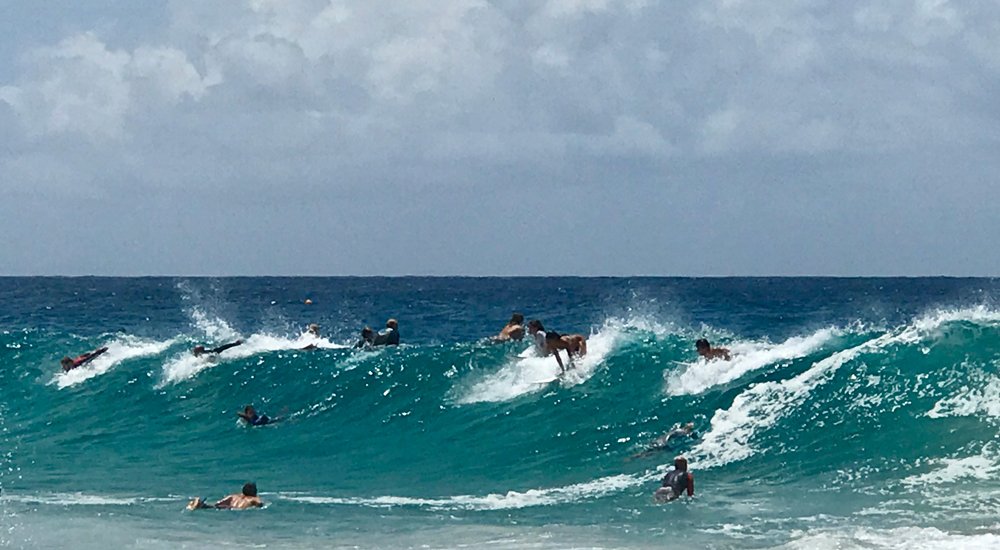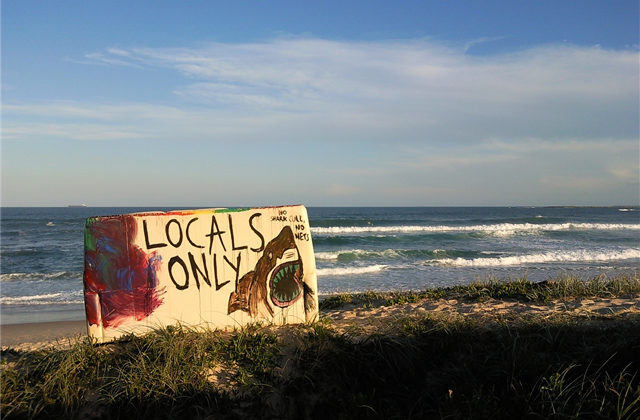Surfing is not a team sport. With a few exceptions, surfing, with its one-wave-per-person rule, is a strictly individual endeavor. Sharing is not usually reciprocated and, unfortunately, your wave count is often directly proportional to how selfish and greedy you are willing to be. Consequently, as in politics and economics, scarce resources (waves) and high demand (a growing surfing population) can lead to aggression, conflict, and violence.
Ergo, localism. The term is used to describe harassing, intimidating behavior perpetrated by local surfers to discourage outsiders from surfing “their” breaks. (Cover photo: Uthinki)
View this post on InstagramGNARLY localism. (📷: @surfline) #yew #localism #ourbeach
A post shared by yew! (@yewonline) on
In extreme cases, localism is manifested in regular, organized use of fists (or deadlier weapons), surf sabotage, vandalism, and threats to enforce etiquette. It also ensures that locals get their pick of waves and/or to keep outsiders from entering the lineup at all. For example, at surfing mecca Pipeline, and other breaks along Hawaii’s North Shore, “Respect the Locals” is not just a catchphrase but a necessity if you plan to get waves at the holy grail of surfing AND if you want to make it back home in one piece.
In 2016, a lawsuit was filed against local surfers in Palos Verdes, California to quell the ruthless and systematic localism at Lunada Bay. For decades, despite continuously swelling crowds at surrounding breaks, locals had Lunada Bay’s waves all to themselves. Such exclusivity was maintained by locals threatening violence, badgering, heckling, throwing rocks at any non-locals who dared walk down the cliffs to the wave. In the water, non-locals were verbally harassed, run over in the water, and dropped in on every wave. Upon returning to the parking lot, non-locals would find their cars keyed, tires slashed, and windshields written over with profanities in surf wax.
Localism isn’t limited to kook-badgering in California or Hawaii. Joel Parkinson – every surfer’s style hero, was deliberately burned on half of his waves at Mundaka, in the Basque Country. Kelly Slater came back from a surf on Australia’s Gold Coast to find his car had “FUCKWIT” written over it in surf wax. A few days ago, a teenager and two adults were shouted abuse and shot at while surfing a wave that’s patrolled by territorial locals in New Zealand.
When I started thinking about this topic, since I’m still paying my dues and waiting for scraps at certain breaks, I felt I skewed anti-localism. Surprisingly, I have found the issue to be much more complicated.
I have zero sympathy for the affluent, middle-aged white men who terrorize outsiders at Lunada Bay, and I generally see aggressive, violent localism as a symptom of testosterone-fueled toxic masculinity I hope is en route to extinction. I do, however, understand that people want to protect breaks that inducted them into the lifelong love affair with the ocean, from turning into clogged lineups found at Snapper or Malibu. I can relate, as I feel mildly murderous every time I see another 19-year-old blonde yahoo on an obnoxiously loud café racer, unbuttoned shirt and unsecured surf rack bungee cords flapping in the wind, zooming sans helmet down my street in Bali that interrupted nothing but rice paddies just five years ago. While I curse the day the New York Times outed Canggu as that “Bohemian Place in Bali, Where Serenity Rules,” I realize that change and crowds are shitty but unavoidable realities of our overpopulated times.

The issue is further complicated by the colonial history and economic disparities in many surf destinations. Hawaiians were royally screwed by U.S. settlement and annexation. So, for outsiders to take waves off the people who invented surfing and revere it as a significant cultural and spiritual practice (which was banned and almost snuffed out by colonizing Christians) adds neo-colonial insult to old injury, especially if done disrespectfully.
In Bali, surf guides use their “local” status to push clients into waves that are already occupied, creating would-be surfers who are dangerously clueless about surf etiquette. But that is how the guides feed their families. Often, if they insisted on teaching safety and etiquette, dissatisfied clients would use their dollar power to hire another guide willing to provide propulsion into other peoples’ waves.
In short, I despise first-worlders who are uber-territorial at their home break but go to places like Indo, Hawaii, Fiji, Costa Rica, etc., expecting to take waves away from locals there. Most surfers in developing countries, however, cannot afford surf travel. So I do think they deserve respect and priority on their own waves.
View this post on InstagramA post shared by the Kook of the Day (@kook_of_the_day) on
One legit pro-localism argument is that it can enforce etiquette, order, and, as a result, safety in a lineup that could otherwise be anarchy. Probably not a bad thing when 100+ people vie for 20-30 foot waves over shallow reef and volcanic rock, and the consequences of a bad wipe-out due to take-off chaos or a drop-in could be fatal. If, for example, a beginner paddles out at Pipeline/Uluwatu/Padang-Padang on a big day (read: safety hazard), I think the locals should tell them, non-violently, non-aggressively, but in no uncertain terms, to get out of the water.
Read also: Surfing as an “Unacceptable” Woman
So, with the numbers of surfers worldwide ballooning, there are no easy answers to this increasing tragedy of the commons. But there are absolutely ways to comport yourself with respect, which goes a long way. If you’re at a new break, don’t paddle straight out to the peak, and wait a bit before you take off on a set wave. Smile, say good morning. Don’t drop in. Don’t be a snake! Don’t paddle out if the surf is beyond your abilities. If you’ve just caught a wave, don’t catch the next one. Apologize if you mess up and get in somebody’s way. The locals who are worth their salt will notice and appreciate the good vibes you’re spreading, which translates into more waves for you.
View this post on InstagramA post shared by the Kook of the Day (@kook_of_the_day) on
It’s not all bleak. Early in my surf career, I accidentally dropped in on a local in Nicaragua. I apologized profusely but he just laughed and said, “I live here and get to surf waves like this every day, tranquila, chica.” We ended up having a lovely chat and a pleasant surf together. These types of friendly interactions have been the norm in Indonesia where, even if the locals do push their guests into my waves, I kid them about it and they apologize. From experience and hearsay, plenty of breaks in Indonesia, Nicaragua, Sri Lanka, Costa Rica, the Philippines, and the Maldives are home to mellow locals who won’t begrudge you waves, as long as you’re respectful. Most locals anywhere will accept to have a beer with you on the beach, which is a golden opportunity to connect and learn about local surf, culture, and life.
I’ve also noticed that the best surfers rarely engage in aggro chicanery – they don’t need to, as they just surf circles around everybody else. I try to emulate them and hope some of their skill and zen rub off on me. They certainly look like they are having more fun… and isn’t that the point, after all?
View this post on InstagramA post shared by iSUPnSURF (@isupnsurf) on
